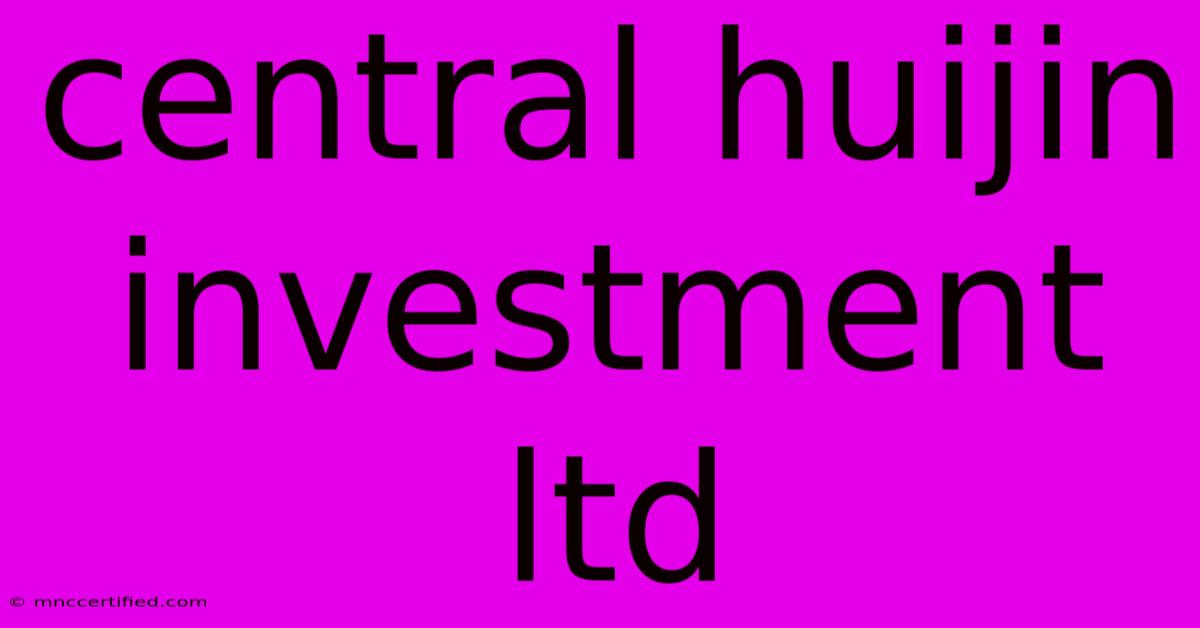Central Huijin Investment Ltd

Table of Contents
Central Huijin Investment Ltd: A Deep Dive into China's Sovereign Wealth Fund
Central Huijin Investment Limited (Central Huijin) is a prominent and often mysterious entity in the world of finance. While its operations aren't as transparent as some Western sovereign wealth funds, understanding its role is crucial for comprehending China's economic policies and global financial influence. This article will delve into Central Huijin's history, investment strategies, holdings, and its significance in the broader context of China's financial landscape.
Understanding Central Huijin's Mandate
Central Huijin, established in 2003, is a wholly state-owned investment company under the direct supervision of the Ministry of Finance of the People's Republic of China. Its primary mandate is to manage and safeguard state-owned assets, primarily focusing on financial institutions. This includes stakes in major Chinese banks, insurance companies, and securities firms. While its exact investment objectives aren't publicly declared in detail, the core aim is to maintain financial stability and support the country's economic growth.
Key Objectives & Strategies:
- Financial Stability: Central Huijin plays a critical role in stabilizing the Chinese financial system during times of market volatility. This often involves strategic investments and interventions to prevent systemic risks.
- Long-Term Growth: While focused on stability, Central Huijin also aims for long-term growth of its assets. This involves carefully selecting investments that align with China's economic development plans.
- Strategic Investments: Beyond purely financial returns, Central Huijin's investments often have a strategic dimension, supporting national policy goals and strengthening the competitiveness of Chinese companies on a global scale.
Central Huijin's Portfolio: Unveiling the Holdings
The precise details of Central Huijin's portfolio are not publicly disclosed with complete transparency. However, based on available information and analyses, its holdings are known to include significant stakes in several major Chinese financial institutions. This typically includes:
- Major State-Owned Banks: Central Huijin likely holds significant shares in institutions like the Industrial and Commercial Bank of China (ICBC), the China Construction Bank (CCB), the Agricultural Bank of China (ABC), and the Bank of China (BOC). These banks represent a considerable portion of China's financial assets.
- Insurance Companies: Similarly, Central Huijin is believed to have substantial investments in leading Chinese insurance companies, playing a role in securing the stability of the insurance sector.
- Securities Firms: Investments in securities firms further enhance Central Huijin's influence and ability to manage and support the overall financial market.
Note: Due to the limited public disclosure, the exact percentages of ownership remain largely undisclosed, adding to the mystique surrounding the organization.
The Significance of Central Huijin in the Global Financial Arena
Central Huijin's actions have significant implications for both the Chinese economy and the global financial system. Its decisions concerning investments, interventions, and policy influence can significantly impact market trends and investor sentiment. The fund's growing prominence underscores China's increasing role in global finance and its capacity to influence international markets.
Impact and Influence:
- Market Stability: Central Huijin's interventions in times of market stress can help prevent major financial crises, both domestically and potentially globally.
- Global Investment: As Central Huijin continues to grow its assets and expand its investment activities, its influence on global capital flows will likely increase.
- Geopolitical Implications: Central Huijin's investment strategies are often seen as aligning with China's broader geopolitical and economic ambitions, influencing the dynamics of international relations.
Conclusion: A Powerful but Enigmatic Player
Central Huijin Investment Ltd. remains a somewhat enigmatic entity. While its operational details are not always fully transparent, its significance in China's financial system and its growing influence in global markets are undeniable. Understanding its role is crucial for anyone seeking to analyze China's financial landscape and its potential impact on the global economy. Further research and analysis are needed to fully uncover the strategies and long-term objectives of this powerful sovereign wealth fund. The opacity surrounding Central Huijin, however, adds to the complexity and intrigue of its position in the world of international finance.

Thank you for visiting our website wich cover about Central Huijin Investment Ltd. We hope the information provided has been useful to you. Feel free to contact us if you have any questions or need further assistance. See you next time and dont miss to bookmark.
Featured Posts
-
Mid Missouri Insurance Agency
Nov 29, 2024
-
Tessa Brown Shelter Insurance
Nov 29, 2024
-
Univista Insurance Flagler 57
Nov 29, 2024
-
This Morning Stars Blunt Reply To Phillips
Nov 29, 2024
-
Top Mac Book Deals Walmart Black Friday
Nov 29, 2024